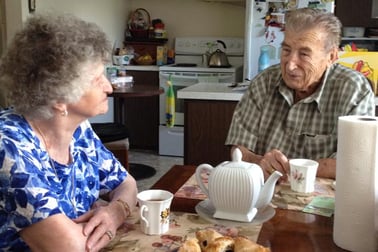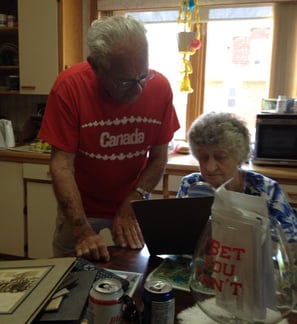"Shared authority," according to Michael Frisch, captures the essence of the oral history enterprise. Emphasizing the collaborative nature of the discipline, it forces us to think about how we may make oral history a more democratic cultural practice. Although I was familiar with Frisch’s work prior to conducting interviews for this project, I had no intention of engaging with it. While I recognized that collaboration was central to the interview process – interviewers and their interviewees work together to create a living history of the past – I did not plan to share authority with my interviewees in any other ways. A lack of funding, and hence a limited amount of time, forced me to establish a clear set of priorities. I planned to conduct 100 single, life story interviews with 50 Ukrainian men and 50 Ukrainian women in a one-year period. Since the public archive was relatively silent when it came to the history of Sudbury’s Ukrainians, I decided to use these oral histories to supplement the written record. It was not until I placed my first advertisement in the bulletin at my Baba’s church, St. Mary’s Ukrainian Catholic Church, and failed to receive a single response that I realized my priorities had to change. Whether I wanted to or not, I would, in the end, learn to share authority with my Baba.
Together, Baba and I interviewed 72 Ukrainian men and women from the Sudbury region. Given Baba’s role, as both co-interviewer and interview coordinator, her memories and her participation in this project are integral to the narrative of this website. It demonstrates the links between Baba’s social network and our interviewees and how her memories helped me navigate the history of Sudbury’s Ukrainians. Certainly, there were advantages and disadvantages of having Baba in the interview space.




Above: Baba and Bill Semenuk reminisce about the past. Below: Peter Chitruk and Baba look at a family album.
Baba brought a great deal of integrity to the interview space, acting as an interviewer, a translator of language and shared experiences, a trusted community insider, and a close friend and/or acquaintance to those we interviewed. Given her personal connection to our interviewees, she made the interview space feel like a meeting between old friends rather than an impersonal interview. We did not have to build trust; it was already there. The problem, however, was that Baba and our interviewees would get swept up in their conversations. They would tell anecdotal stories while I sat on the sidelines and watched. I actually felt quite powerless in these spaces at times, like a young granddaughter, not a trained historian. Although I would jump into the conversations from time to time and ask questions, interviewees would answer them and then proceed to speak with Baba, not me. At other times, I would ask questions, the interviewees would answer them, and then Baba would proceed to answer the questions as well, telling and retelling the stories that I had heard throughout my life. Instead of remembering their own experiences, interviewees would get wrapped up in Baba’s story. By interrupting them, Baba also effectively silenced interviewees and dominated the interview space. In doing this, Baba was not only establishing their place in her social world, but also trying to relate to them on a personal level through shared experiences. These audio clips illustrate the benefits and challenges of sharing authority with Baba in the interview space.
It took Baba and me many interviews to begin to share authority in a fruitful way; collaborative work takes time and practice to develop. We never perfected this three-way exchange, but we managed to transform it into a working relationship that eased my frustrations and suited my needs as well as those expressed by Baba and our interviewees.
In these audio clips, Baba and I reflect on our interviewing experiences – the interview process, the lessons we learned, the challenges we faced, and Baba’s role in shaping the project.
“Oral sources,” as Alessandro Portelli reminds us, “tell us not just what people did, but what they wanted to do, what they believed they were doing, and what they now think they did.” In other words, nothing is certain in oral history. This kind of source tells us less about events than about their meanings. It is therefore next to impossible to be objective, neutral, or balanced when it comes to doing oral history. In this instance, I not only built subjective links to my interviewees but also to my grandmother. Although sharing authority with Baba could be challenging at times, it was absolutely necessary in order to gain access to the Ukrainian community.
Fortunately, once we worked through many of the problems that plagued the interview spaces – establishing boundaries as well as a set of rules – we developed a relationship that worked for us as well as our interviewees. There is no doubt that this relationship was tested on many occasions. A messy process, collaboration was demanding, requiring, as Linda Shopes asserts, an ability – even courage – to deal with people and situations that can be difficult; a certain tolerance for ambiguity and uncertainty about how a project will work out; and a willingness to take risks, not follow established protocols, and make decisions based on the logic of the work itself. Successfully sharing authority, especially with family members, necessitates dialogue at every stage of a project. Conflict and consensus will result. These are healthy outcomes, as this project confirms, that allow us to not only develop personal relationships, but also push the boundaries of the discipline.
Baba and Lorraine Jurgilas (nee Burke), Baba’s best friend, speak about a shared childhood memory.
Baba reflects on her involvement in the project.